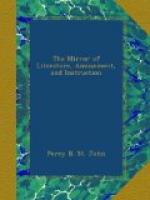A mackerel lives longer out of water than does an Actor out of his element: he cannot, for a minute, “look abroad into universality.” Keep him to the last edition of a new or old play, the burning of the two theatres, or an anecdote of John Kemble, and our Actor sparkles amazingly. Put to him an unprofessional question, and you strike him dumb; an abstract truth locks his jaws. On the contrary, listen to the stock-joke; lend an attentive ear to the witticism clubbed by the whole green-room—for there is rarely more than one at a time in circulation—and no man talks faster—none with a deeper delight to himself—none more profound, more knowing. The conversation of our Actor is a fine “piece of mosaic.” Here Shakspeare is laid under contribution—here Farquhar—here Otway. We have an undigested mass of quotations, dropping without order from him. In words he is absolutely impoverishable. What a lion he stalks in a country town! How he stilts himself upon his jokes over the sleek, unsuspecting heads of his astonished hearers! He tells a story; and, for the remainder of the night, sits embosomed in the ineffable lustre of his humour.—Monthly Mag.
* * * * *
THE NOVELIST.
* * * * *
THE BROKEN HEART.
A mutual affection had existed from their very childhood between Henri Merville and Louise Courtin; their respective parents were near neighbours, and on very friendly terms with one another; they, therefore, watched the infantile attachment of their children with great pleasure, and with still more self-congratulation did they perceive that, growing with their growth, and strengthening with their strength, it had ripened into an ardent and deep-rooted passion. When Henri, however, had attained his twentieth year, Louise being also only seventeen, it became necessary that he should leave the humble village of Verny, and perfect himself in his trade as a cabinet-maker, by visiting and working in some large and opulent towns. The lovers, amid their increasing happiness, had never thought of this long separation; so that when Henri was told by his father that he must leave home, and be away three years, and Louise informed by her mother of the same circumstance, the intelligence came upon them like an earthquake. Woman’s feelings are more easily excited, and Louise felt as if Verny would be a desert without her dear Henri; he too was sad enough, although the preparations for his journey occupied the greatest portion of his time, and prevented his so continually thinking of the separation as she did. Grief and regret were useless; the parting hour arrived, and the now miserable pair were left to themselves. They mutually made vows of eternal constancy and fidelity; as is the custom in the provinces, they exchanged rings, and became rather more resigned to their unavoidable separation.




